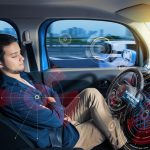 Autonomous cars seem in a perpetual state of ‘just around the corner’, with that pending arrival en masse always tantalizingly out of reach. Nonetheless, this is not stopping people attempting to assess the various factors surrounding the technology.
Autonomous cars seem in a perpetual state of ‘just around the corner’, with that pending arrival en masse always tantalizingly out of reach. Nonetheless, this is not stopping people attempting to assess the various factors surrounding the technology.
The latest of these comes from the recent study from Arthur D Little on public attitudes towards driverless cars. The research found that trust in the technology has plummeted by 10% since 2015, with the concept of car ownership still enduringly popular across all generations.
The study also revealed that drivers are open to alternative drivetrains, with a majority saying they’d happily pay more for a hybrid vehicle, and roughly 50% saying they would do so for an electric vehicle. Indeed, of those who are planning to replace their current vehicle, around half said they would gladly consider either a hybrid or electric car.
“Extending our groundbreaking 2015 automotive study shows enormous changes. While attachment to car ownership remains high, meaning the overall automotive market will remain stable, the switch to alternative drivetrains and new mobility options will disrupt manufacturers, with EV driver demand exceeding currently planned capabilities and ecosystem readiness,” the researchers explain.
Trust in autonomous vehicles
Perhaps the most interesting finding is that trust in autonomous vehicles has fallen, with most respondents revealing concerns around personal data.
“Drivers in all countries we surveyed except China are becoming much more sensitive around private data. In the long run, protecting this data will become a key competitive differentiator for manufacturers and providers of mobility solutions,” the authors say.
The findings provide an interesting counter to a second study, published recently by Flinders University that explored levels of trust in autonomous technology today.
The researchers conducted a survey at a business park in Australia that was about to undertake a trial of a driverless shuttle bus to transport people around the campus, and to/from the nearby bus and train stations. The survey was designed to understand how people felt about the vehicles, and their level of trust in them.
The largest concern was about the reliability of the vehicle, and the ability of it to meet the performance expectations of the passenger. This was especially so when the car encountered unexpected situations. People also expressed concern about the security of the vehicle, especially in terms of preventing hacking and unauthorized remote control.
People seemed more willing to trust autonomous vehicles in closed environments, such as holiday parks or university campuses as the routes are pre-specified. There was also a higher willingness to trust a driverless vehicle in certain circumstances, such as in low traffic areas or when finding a parking spot.
There was little willingness to sit in a vehicle with no driver controls however, whilst travelling in high pedestrian areas also made respondents nervous.
Now, it should be said that the survey was only conducted on around 100 people, so the sample size was very small, so there must be the usual caveats around how representative the study is of wider public feeling.
The researchers do believe however, that their work provides an insight into some of the concerns people have with the technology, and perhaps even the environments in which it can be first deployed to help develop the kind of trust it so badly needs for it to gain a more widespread audience.